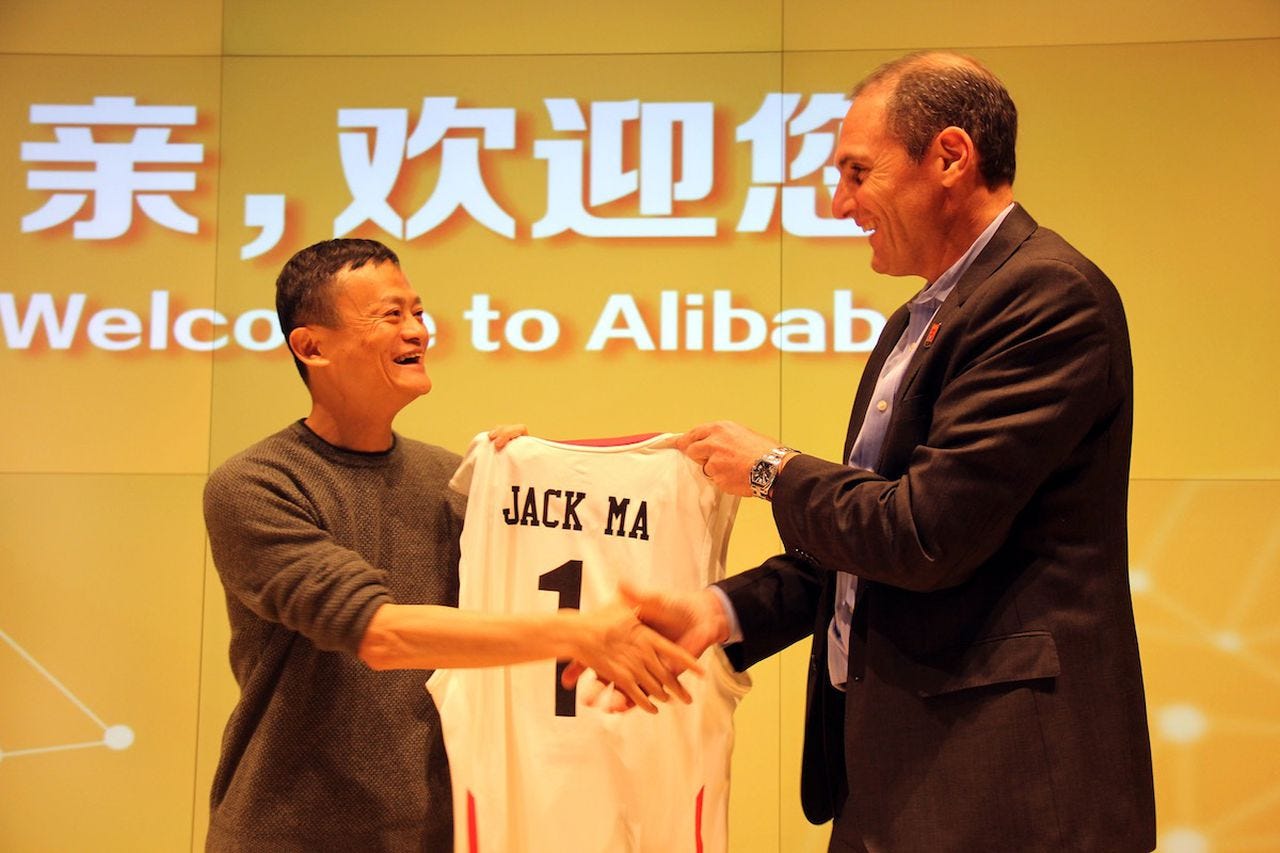Canzano: A lesson learned in China
The value of keeping your eye on the ball.
Arizona State was dispatched to Shanghai to start the 2019 men’s basketball season. The Pac-12 Conference was on a mission to infiltrate China. The initiative was Commissioner Larry Scott’s brainchild. But it was coach Bobby Hurley’s team that got left holding the bag.
The Sun Devils tipped off the basketball season that November with a conference game — against Colorado — nearly 6,000 nautical miles from campus.
Said one conference staff member on the trip: “There was just a feeling of — ‘why?’”
Scott wanted to do business with China. On those annual trips, the Pac-12’s commissioner dined at five-star restaurants with Joe Tsai, the chairman of Alibaba, and delighted tycoon Jack Ma by presenting the billionaire a basketball jersey with his name stitched on the back.
The basketball game in 2019 was sold to the programs as an attempt to grow the sport. Except when the Pac-12 basketball teams emerged from the locker rooms and walked into the arena the coaches and players looked around and saw empty seats.
Announced attendance: 4,328.
“There was hardly anybody in the building,” the staffer said.
The game itself was televised on ESPN2 — at 8:30 p.m. MT — during the height of college football season. ASU finished 20-11 that season, but lost the opener in China by 10 points to Colorado. The Sun Devils were the lone team in the Pac-12 to start the basketball season 0-1.
I thought about that surreal scene on Thursday when the Big 12 Conference announced it will explore playing basketball games and a football bowl game in Mexico. It’s a far better concept and not just because it’s closer geographically to the United States.
“Big 12 Mexico” will include men’s and women’s basketball games between Houston and Kansas in Mexico City in Dec. 2024. The conference also wants to play the first-ever bowl game in Monterrey, Mexico beginning in 2026.
Be sure, it’s a money grab.
That’s what college athletics has become. But it’s not a clumsy one like the Pac-12’s decade-long attempt at getting cozy with China. If the Big 12 follows through, the Mexico events get Brett Yormark’s conference some sunshine, attract fresh audience, and generate revenue.
Playing in Mexico also adds some new juice to the wilting bowl season, the travel demands aren’t obscene, and the December date on the conference basketball games lands about right.
The Pac-12 put on a series of sporting events in China over the years. The ASU-Colorado men’s basketball game was the 13th edition. Some other attempts — before and after it — included soccer and volleyball, but basketball was typically the centerpiece.
I covered the Beijing Olympics in 2008. China is basketball-crazed. The USA “Dream Team” was the hottest ticket of the Olympics alongside gymnastics and swimming (See: Michael Phelps). I spent three weeks in China. I walked past a series of playgrounds on a daily basis and noted that every Chinese kid bouncing a ball seemed to be wearing a pair of high-top sneakers and an NBA replica jersey.
The Pac-12’s own effort in China fell flat. The college conference didn’t have the basketball star power of the NBA, after all. Aside from the 2018 trip, when a couple of UCLA freshman including LiAngelo Ball were arrested for shoplifting sunglasses in China, the games didn’t make big news back home either. And sending all those “student-athletes” across the ocean didn’t result in a lucrative business partnership for the conference.
What was Larry Scott thinking?
He isn’t returning calls these days. If you give Scott the benefit of the doubt, you view the “China Initiative” as a well-intentioned misfire. If you don’t, you see it as another of Scott’s well-documented junkets. For all we know, Scott may have just desired face time with Tsai and Ma. It’s why I long suspected the ex-commissioner might land a consulting gig with Alibaba after his departure.
A few of the Pac-12 schools embraced the adventure, however. Washington, in 2015, went over a few days before playing the basketball game, toured the Alibaba headquarters, and did some sight-seeing.
A second Pac-12 source who made several of the China trips told me he thought the initiative had very little to do with sports. The conference presidents and chancellors wanted exposure to prospective Asian students. It was an effort designed to boost applications and enrollment. The basketball games were a way to help build the profile of the Pac-12 universities.
The schools themselves still sometimes take their teams on foreign tours, but the Pac-12 isn’t the organizing entity these days. Also, the trips typically happen in the summer months. Oregon coach Dana Altman took his team on an exhibition trip to Canada last August, for example. It’s a recruiting tool and includes some team building.
I like the idea of growing college sports. I admire ambition and understand the almighty pursuit of revenue. But any business worth a damn knows it needs to keep its eye on the primary target — doing good business at home.
Please tell me the Pac-12 has learned that.
I appreciate all who support, subscribe and share this independent endeavor. If you haven’t already — please consider subscribing or gifting a subscription to a family member or friend.



There is always unseen big trouble when people and their development pushes that out the door for big money. Can’t understand why no one ever stood up against one man’s decision ( poorly in retrospect) over the good of students and all the schools represented. Surely, there must be those who have the ability to see through the ulterior motive of one. Where is common sense anymore?
Larry Scott, the gift that keeps on giving (to sports writers). Only one word describes this clown: Putz